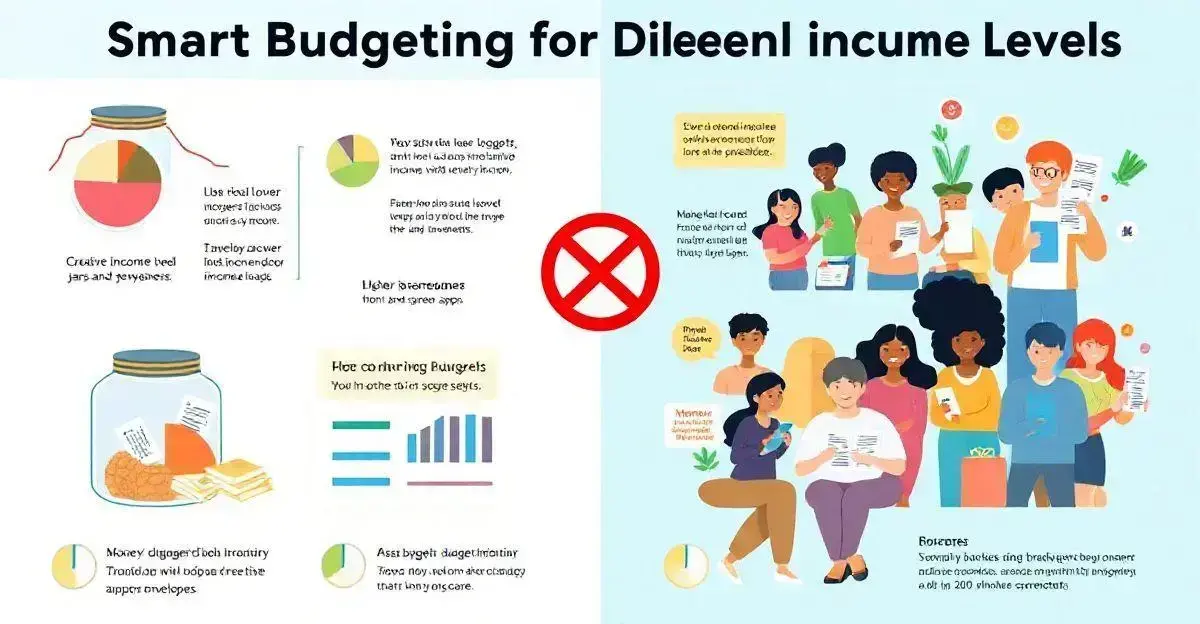Smart budgeting strategies are essential for anyone looking to achieve financial success.
By effectively managing your finances, you can explore new opportunities and reduce stress related to money management.
Understanding Smart Budgeting
Smart budgeting is essential for managing your finances effectively and ensuring a secure financial future.
To begin, list all your income sources, including your salary, bonuses, and any side earnings. Next, document your monthly expenses, dividing them into fixed costs (such as rent or mortgage) and variable expenses (like groceries or entertainment).
Once your income and expenses are outlined, compare them to assess whether you are living within your means. This comparison highlights areas where you can cut back or reallocate funds.
A key aspect of smarter budgeting is distinguishing between needs and wants. Prioritize spending on necessities that enhance your well-being and reduce non-essential expenses.
Using budgeting tools or apps can make the process easier by tracking your financial activities in real-time. These tools provide valuable insights and alerts to help you stay on track.
Regularly reviewing your budget allows you to adapt to changing circumstances and remain aligned with your financial goals.
Smart budgeting is an ongoing process of learning and adjusting. With commitment, you can create a sustainable financial plan that supports your lifestyle while preparing for future challenges.
Benefits of Smart Budgeting Strategies

Benefits of smart budgeting strategies are numerous and impactful. Firstly, a well-planned budget allows you to track your spending effectively, making it easier to identify areas where you can cut back. By monitoring your expenses, you can realise where your money goes each month and adjust accordingly.
Additionally, smart budgeting helps in setting realistic financial goals. Whether you aim to save for a holiday, pay off debt, or build an emergency fund, having a budget gives you a clearer path to achieving these objectives. You can allocate specific amounts towards your goals, ensuring that you stay on track.
Another significant advantage is reducing financial stress. When you know you have a budget in place, it provides a sense of control over your finances. This helps alleviate anxiety about unexpected expenses, as you will have a plan to address them.
Furthermore, implementing smart budgeting strategies can lead to better decision-making. When you are aware of your financial limits, it becomes easier to make informed choices about spending, investments, and savings. This conscious approach fosters a healthier relationship with money.
Lastly, smart budgeting encourages long-term financial stability. By consistently managing your money, you will find it easier to build wealth and prepare for future needs, such as retirement. This proactive attitude is key to achieving lasting financial security.
Key Elements of a Smart Budget
Key elements of a smart budget are essential for effective financial management. First and foremost, income tracking is crucial. List all sources of income, including paychecks, bonuses, and any side hustles. This gives you a clear picture of your financial inflow.
Next, you should document fixed and variable expenses. Fixed expenses are costs that remain constant each month, such as rent or mortgage payments. Variable expenses include things like groceries, entertainment, and dining out, which can change. Categorising these expenses helps you understand where your money goes.
Another important element is setting financial goals. Decide what you want to achieve, such as saving for a vacation, paying off debt, or building an emergency fund. Having clear goals motivates you to stick to your budget.
It’s also vital to create a monthly plan. Outline how much you plan to spend in each category, ensuring that your total expenses do not exceed your income. This step helps prevent overspending. You may also want to include a savings allocation to contribute to your long-term goals.
Additionally, regular monitoring and adjusting your budget is key. Check your spending weekly or monthly to see if you are sticking to your plan. If not, make adjustments to your budget accordingly, whether it’s cutting unnecessary expenses or reallocating funds.
Finally, use budgeting tools or apps for convenience. They can simplify tracking your income and expenses, and they often provide useful insights into your spending habits. By incorporating these elements, you can establish a robust budgeting strategy that supports your financial well-being.
Tools for Budgeting Success

Tools for budgeting success can significantly enhance your financial management. Budgeting apps such as Mint or YNAB (You Need A Budget) help you track your income and expenses easily. They offer features like automatic categorisation of expenses, which simplifies the process of keeping your budget updated.
Another useful tool is a spreadsheet. Creating a budgeting spreadsheet in programs like Microsoft Excel or Google Sheets allows for customised tracking of your financial data. You can set up formulas to calculate totals and see where you stand financially at any time.
Envelope budgeting is a traditional method that still works well for many. In this approach, you allocate cash for specific categories into separate envelopes. Once the cash in an envelope is gone, you cannot spend in that category until the next budgeting period.
Additionally, many banks offer budgeting tools integrated with their online banking. These tools can help you categorise spending and set savings goals, making it easier to stick to your budget.
Financial planning software is another option. Programs like Quicken or Personal Capital offer comprehensive features that assist with budget tracking, investment management, and retirement planning.
Lastly, using financial advisory services, whether online or in-person, can provide tailored guidance on your budgeting strategy. They can help you create a budget that aligns with your specific financial goals and needs.
Creating Your Personalized Budget
Creating your personalized budget is a vital step in managing your finances effectively. Start by gathering all financial information, including income and expenses. This gives you a clear view of your financial situation.
Next, categorise your expenses. Break them down into fixed costs like rent and variable costs like groceries. Knowing where your money goes will help you identify areas for improvement.
Setting realistic financial goals is essential. Whether it’s saving for a holiday or building an emergency fund, having clear targets makes budgeting more meaningful. Allocate specific amounts each month towards these goals.
Once you have a plan, use a budgeting method that works for you. You can choose from approaches like the 50/30/20 rule, where 50% goes to needs, 30% to wants, and 20% to savings or debt repayment.
It’s also useful to regularly review your budget. Adjust it monthly based on your spending and any changes in income. This ensures that your budget stays relevant and practical.
Lastly, consider using budgeting tools or apps that can help automate tracking your finances. These tools can simplify the process and provide visual representations of your financial health.
Common Budgeting Mistakes to Avoid

Common budgeting mistakes to avoid can significantly impact your financial health. One major mistake is not tracking expenses. When you do not keep an eye on where your money goes, you may overspend in certain categories.
Another common error is setting unrealistic goals. It is essential to have achievable financial targets. If your goals are too ambitious, you might feel discouraged and abandon your budget altogether.
Many people also neglect to include irregular expenses in their budget. Costs like car maintenance or annual subscriptions should be planned for as well. Ignoring these may lead to unexpected financial strain.
Failing to adjust your budget is another frequent pitfall. Life circumstances change, such as job changes or new expenses. Regularly reviewing and updating your budget is crucial to stay on track.
Finally, some may fall into the trap of giving up too quickly. Budgeting is a learning process, and it takes time to find what works for you. Stick with it, learn from mistakes, and refine your approach.
Adjusting Your Budget Over Time
Adjusting your budget over time is vital to maintain financial health. As your life circumstances change, it is essential to review and update your budget regularly. This means looking at your income, expenses, and financial goals to reflect your current situation.
Consider major life changes such as getting a new job, moving to a new home, or starting a family. These events can impact your income and expenses, prompting the need for a budget adjustment. Recognising these changes allows you to allocate funds properly.
Another factor to consider is seasonal expenses. Some months may have higher costs, like holidays or back-to-school shopping. Anticipating these expenses helps you prepare and adjust your budget accordingly.
Don’t forget to factor in unexpected costs such as medical bills or car repairs. If your budget lacks room for these unexpected events, it can throw you off track. Adjusting your budget to include a contingency fund can be helpful.
Lastly, regularly track your progress toward financial goals. If you’re saving for a trip or paying off debt, adjust your budget to keep moving forward. Celebrate small wins to stay motivated.
Smart Budgeting for Different Income Levels

Smart budgeting for different income levels is essential for financial success. Each individual or household has unique financial situations, so it is important to understand how to create a budget that works for you. Identify your income sources first, whether it is a fixed salary, variable income, or multiple streams of revenue.
For those with a fixed income, such as a regular paycheck, creating a budget may involve determining essential and non-essential expenses. This clarity helps in allocating funds more wisely. Consider using the 50/30/20 rule where 50% of your income goes to needs, 30% to wants, and 20% to savings and debt repayment.
If your income is variable, as in commission-based jobs or freelance work, it is crucial to track your average monthly earnings. Plan your budget around your lowest expected income to maintain financial stability during lean months.
For higher income levels, investment opportunities may arise. Allocating a portion of your budget towards investments can help build wealth over time. Consider diversifying your investments to reduce risk.
Finally, don’t forget to review your budget regularly. Income levels can change due to promotions, job changes, or other factors. Adjust your budget to reflect these changes, ensuring it continues to align with your financial goals.
Long-term Financial Goals with Smart Budgeting
Long-term financial goals with smart budgeting are crucial for achieving financial stability and success. One of the first steps is to identify your goals. This could include saving for retirement, buying a home, or funding your children’s education. Having clear goals helps you determine how much you need to save each month.
Next, understanding the concept of savings rate is important. You should aim to allocate a percentage of your income towards your long-term goals. A common recommendation is to save at least 20% of your income, but this may vary based on individual situations.
It’s also essential to consider investment options. Simply saving money may not be enough due to inflation. Explore various investment vehicles such as stocks, bonds, or mutual funds to grow your savings over time.
Additionally, regularly reviewing your budget and progress towards your long-term goals is necessary. Set aside time quarterly or biannually to assess if you are on track. Make adjustments to your budgeting strategy if you find you are not meeting your targets.
Lastly, staying disciplined is key to achieving your long-term financial goals. Avoid impulsive spending and stick to your budget. By maintaining focus and consistency, you will work towards a secure financial future.
Smart budgeting is essential for financial success
By understanding your income and expenses, you can create a budget that meets your financial goals. Adjusting your budget over time ensures it remains relevant, while tracking your progress helps you stay on target.
Utilising tools for budgeting success and avoiding common mistakes empowers you to manage your finances effectively. Whether you are saving for a short-term goal or planning for long-term financial stability, smart budgeting strategies can help you achieve your dreams.
Remember to stay disciplined and review your budget regularly, adapting as necessary to realise your financial potential.
FAQ – Frequently Asked Questions about Smart Budgeting
What are smart budgeting strategies?
Smart budgeting strategies are methods designed to help individuals effectively manage their finances, set savings goals, and track spending.
How can I track my expenses?
You can track your expenses using budgeting apps, spreadsheets, or traditional pen and paper methods to record and categorise your spending.
What should I include in my budget?
Your budget should include all sources of income, fixed expenses like rent and utilities, variable costs like groceries, and savings goals.
How often should I review my budget?
It is advisable to review your budget monthly to ensure it aligns with your financial situation and goals.
What are common budgeting mistakes?
Common budgeting mistakes include not tracking expenses, setting unrealistic goals, and failing to account for irregular expenses.
How can I create a personalized budget?
You can create a personalized budget by documenting your income, categorising expenses, setting goals, and consistently tracking your spending.
Why is it important to adjust my budget over time?
Adjusting your budget over time is crucial because life changes, such as job transitions or changes in expenses, can affect your financial situation.
Check out our article on Efficient Organization for tips and strategies to boost productivity and stay organized.
